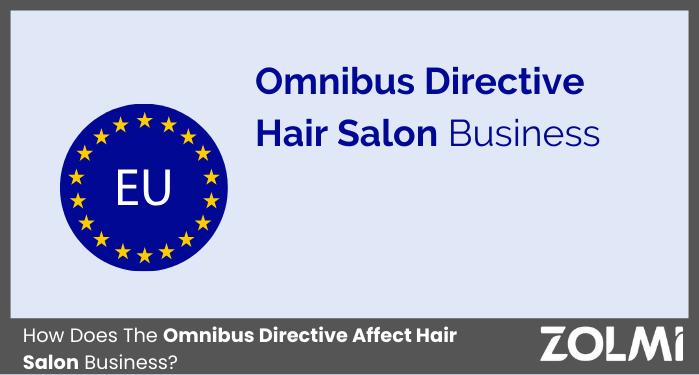How Does The Omnibus Directive Affect Hair Salon Business?


In recent years, the European Union made some new rules to keep up with the changing digital world. One of these rules, called the Omnibus Directive, aims to protect consumers from unfair commercial practices, particularly in online reviews and promotional offers. This rule also applies to businesses in the beauty industry, including hair salons.
In this article, Zolmi will explain how the Omnibus Directive will impact your hair salon business, what measures you need to take, and what risks you can face for lack of compliance.
In February 2023, the Council of Ministers approved the implementation decree of directive 2019/2161, called the Omnibus Directive , which introduces important innovations regarding the protection of consumers about unfair commercial practices, particularly in reviews and promotional offers.
The main objective of the Omnibus Directive is to protect consumers who buy goods and services online from
The Omnibus Directive applies to all forms of online reviews, whether they relate to hair salons, beauty salons, barber shops, restaurants, or other businesses.
If your hair salon uses online reviews, you should provide clear and reliable information about your review verification processes and how you handle positive and negative feedback. In other words, you should clarify whether
Also, the Omnibus Directive doesn't allow your hair salon to use unfair tricks like offering rewards to customers in exchange for good reviews about a service or product.
If you're thinking of using online booking directories like Belliata or external review sites like Tripadvisor or Yelp, make sure these platforms are open about how they collect and handle reviews. The Omnibus Directive wants businesses to be clear about the measures they take to make sure that the reviews are real and come from people who actually used their services.
To follow the Omnibus Directive for your hair salon, you need to:
If your salon uses a platform or system for online reviews, check:
You should use platforms that make sure your hair salon gets real and checked reviews. It's okay if you check them manually, but it's crucial to tell people it's a verified purchase and explain how you handle reviews, just like you do with your Cookie Policy, Privacy Policy, and Terms of Sale.
Article 2 of the Omnibus Directive talks about how your hair salon should handle online discounts for your services and products. It says you need to tell your clients what the price was before you give a discount.
So, when we talk about the "before" price, we mean the lowest price your hair salon offered for a service or product in the 30 days before you added the discount. In other words, whenever you announce a lower price, you have to show what it used to be.
This rule stops tricks like pretending the price went up just so you can make it seem like there's a big discount. But there are some special cases, like when products are about to expire or when you make customized offers. Still, the main idea is to be clear with our customers about your pricing and make sure they trust you.
In simple terms, if you're offering a discount, it has to be based on the lowest price you had in the last 30 days.
For example, if a haircut usually costs 50 euros, and you temporarily raise it to 60 euros, and then give a 20% discount, the final price can't be 60 euros. It should be 40 euros because you're discounting it from the original 50 euros. This rule applies every time you offer a price promo deal, whether it's a price change or a percentage discount.
The Omnibus Directive ensures we can't play tricks with our prices and discounts.
If businesses, including hair salons, don't follow the new rules in the Omnibus Directive, they could face significant penalties e.g., pay fines equal to 4% of their earnings or up to 2 million euros.
In different countries within the EU, there are additional penalties, for instance:
The main goal of the Omnibus Directive, including hair salons, is to stop dishonest practices related to online reviews and pricing. The objective is to ensure that reviews are real and that customers know where they come from and prevent fake discounts.
This helps build trust between hair salons and their clients. Following these rules is important for making sure hair salons offer good services and are honest with their customers.